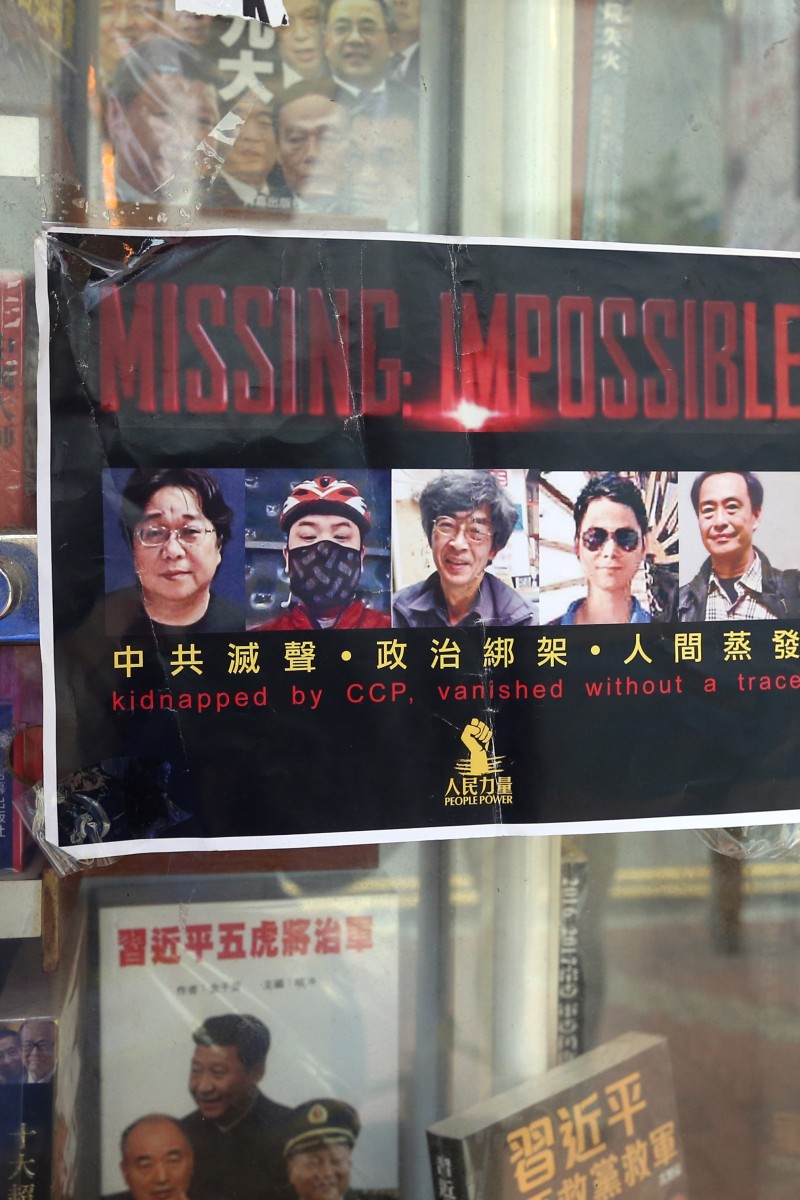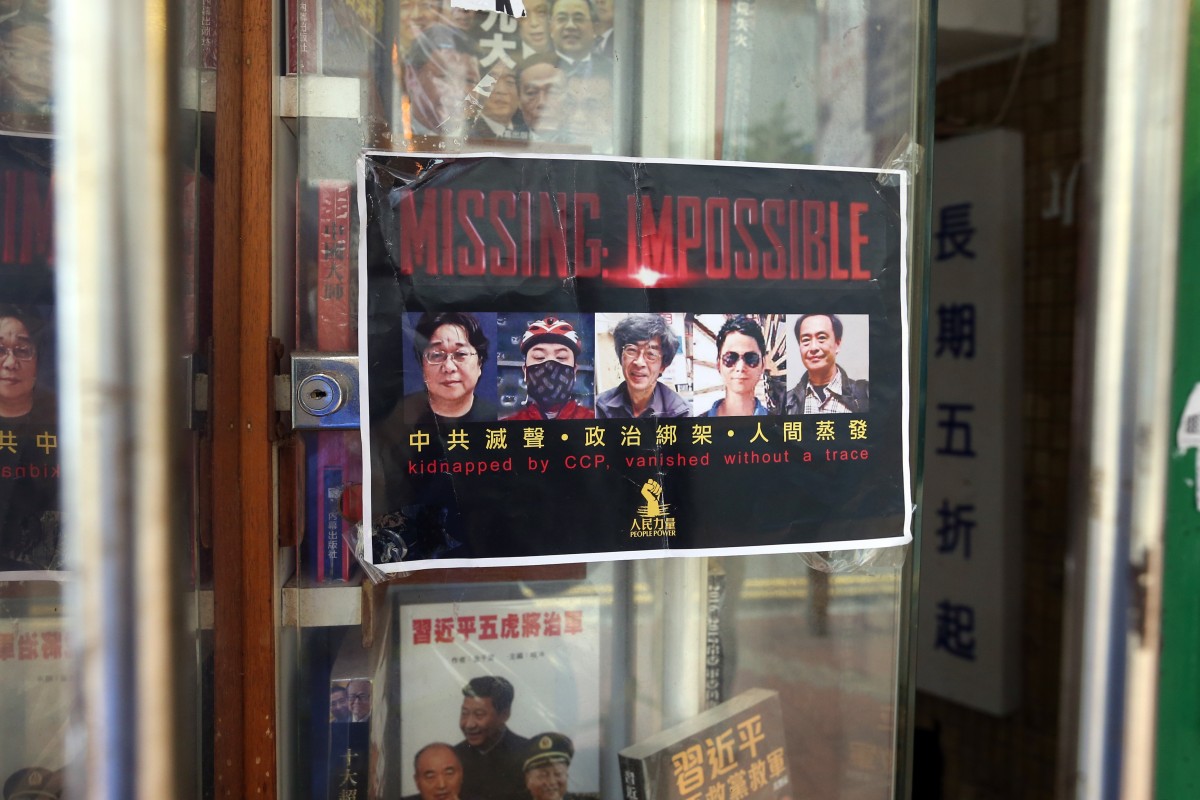
Here's a guide to what's happened thus far in the missing booksellers story, and the related facts, detailing how the confusing case has unfolded
 A poster showing the missing booksellers is seen outside the Causeway Bay Books, a bookstore located on Lockhart Road in Causeway Bay. Photo: K. Y. Cheng
A poster showing the missing booksellers is seen outside the Causeway Bay Books, a bookstore located on Lockhart Road in Causeway Bay. Photo: K. Y. ChengThe disappearance of several publishers and sellers of books banned in mainland China has stirred fears across Hong Kong of mainland interference. As the case continues, it raises more questions with every new twist. Here are how events have unfolded since the first disappearance back in October.
October 17
Gui Minhai, writer and co-owner of publishing house Mighty Current, which runs the Causeway Bay bookshop, goes missing during a holiday in Thailand. He is last seen on closed circuit television at his vacation home in Pattaya.
October 20 -26
Lui Por, general manager of Mighty Current, business manager Cheung Chi-ping and bookstore manager Lam Wing-kee, go missing after separately visiting Shenzhen.
Two weeks after Gui goes missing, he messages his daughter, Angela: “I have put [HK$30,000] in your account in Hong Kong, and hope you will be fine with everything.”
November 3
Four men, three speaking Putonghua, attempt to take away Gui’s computer from his apartment in Pattaya, Thailand.
November 5
Missing person reports are made to Hong Kong police about the three missing members of the bookstore’s staff – Lam, Lui and Cheung. A new investor buys shares in Mighty Current some time in November.
November 10
Lee Bo, a major stockholder in Causeway Bay Books, sends email to Gui's daughter Angela to say that her father “was taken by special agents from China for political reasons”.
December 30
Lee is seen at Mighty Current’s Chai Wan warehouse.
January 1
Lee’s wife, Sophie Choi Ka-ping, reports her husband missing to police. She says she had received two phone calls from Lee where he spoke Putonghua instead of Cantonese and both calls were made from the same Shenzhen phone number. Lee tells her not to make his case widely known and that he was assisting in an investigation.
January 3
A police source says that they had told Lee’s wife there is no record of him leaving the city.
Former secretary for security Regina Ip Lau Suk-yee says mainland officers had never crossed the border to carry out covert law enforcement during her tenure.
Chief Executive Leung Chun-ying says it would be unacceptable and a violation of the Basic Law and the “one country, two systems” arrangement if mainland authorities had made an arrest in Hong Kong. Democratic Party chairwoman Emily Lau Wai-hing says during a radio talk show the incident raised fears among Hongkongers that the principle of “one country, two systems” had been violated.
Democratic Party colleagues hold a small protest outside the liaison office in Sai Wan to demand answers from Beijing. A larger protest with about 50 members of the League of Social Democrats shouts slogans and posts pictures of the missing booksellers at the gates of the liaison office in Sheung Wan.
January 4
Lee’s wife withdraws her request for police help after a friend of her husband had managed to contact him the day before. A handwritten letter, apparently faxed by Lee to his colleague is published by the Central News Agency. The letter states Lee “returned to mainland [his] own way and [is] working with the concerned parties in an investigation which may take a while”.
January 5
China’s Foreign Minister, Wang Yi, describes the missing Hong Kong bookseller Lee Bo as “first and foremost a Chinese citizen”. He responds to questions at a joint press conference with British Foreign Secretary, Philip Hammond, who expresses “deep concern” about the disappearance of 65-year-old Lee, who holds a British passport.
Legislator Ng Leung-sing suggests the Hong Kong bookseller Lee Bo and his four associates took a boat to the mainland to hire prostitutes there. Choi describes the comments – made under Legislative Council privilege – as “shameful and irresponsible”.
A day latter, Ng apologises to Lee and Choi for making the allegations. He says he had wanted the public to have another perspective as rumours were circulating.
January 9
In a second letter, accompanying a video recording, published by Taiwan’s Central News Agency on the eve of a planned protest march in Hong Kong against “political abduction”, Lee asks outsiders not to organise protests. He writes in the letter his return to the mainland had nothing to do with other missing booksellers. “I do not understand why some people want to make a fuss over it.”
January 10
Thousands of Hongkongers show up to Admiralty to protest disappearances of the booksellers .
Hong Kong chief executive CY Leung remains ambiguous on mainland authorities’ deadline to respond under a reciprocal mechanism. Under the arrangement, law enforcement agencies on the mainland must notify the city’s police within 14 days if any Hong Kong resident is detained across the border.
January 12
Legislative Council president, Jasper Tsang Yok-sing urges the central government to send a clear message that they did not violate the “one country, two systems” principle in the disappearance of Lee.
Police investigate the disappearance of Lee and try to identify people who were in the same lift Lee was taking when he left his Chai Wan office on December 30.
January 13
Multiple democratic lawmakers are ejected from Legislative Council chambers during Leung’s Policy Address for heckling and accusing him of not speaking out over the disappearances of the booksellers.
January 17
Gui appears on state television, CCTV saying he turned himself in for absconding the conditions of a two-year suspended sentence in a drunk-driving death from 2003.
After Gui confesses on TV, Lee’s letter to his wife refers to Gui’s “complicated history” and calls him “morally unacceptable”.
January 18
Chinese authorities confirm Lee is detained in mainland China.
Thailand’s Ministry of Foreign Affairs says Thai authorities are“still looking into the case” and it was “in the process” of looking for proof of Gui’s proof of departure from Thailand. Bei Ling, a dissident poet who has known Gui since 1984 says “there was no record of him leaving Thailand”, repeating a message that Swedish authorities passed to Gui’s daughter, Angela.
Sweden Deputy minister of finance Per Bolund presses for openness on Gui’s detention, asking for Swedish official to be allowed to see and contact him.
January 19
Chief Executive Leung prompts more scepticism by insisting it was not unusual that Guangdong security officials took 20 days to inform Hong Kong that bookseller Lee, who disappeared from the city last month, was on the mainland.
January 23
Lee’s wife meets him at a secret location in mainland China in the afternoon. The Hong Kong government was again unaware of Chinese authorities’ actions until Choi made a report to the police hours after the reunion.
Lee passes on a letter to his wife to deliver to Hong Kong police restating he was “safe and free” and not to waste police resources on him.
January 24
Britain’s Sunday Times reveals that a leaked letter identified 14 publishing houses and 21 publications in Hong Kong as targets to be “exterminated”.
In a statement from Hong Kong police, Lee Bo is referred to as “Lee Po.”
January 30
Lee’s wife tells RTHK the bookstore would reopen on Monday, February 1. She does not say if Lee would return to Hong Kong.
February 1
Causeway Bay Books remain closed as reporters and curious tourists check to see if it reopened.
February 4
Guangdong police confirmed the three remaining booksellers - Lui, Cheung and Lam - are in custody and being investigated in mainland China. The force also told Hong Kong police that Lee had rejected their request to meet him.
February 16
Bowenpress.com reports that Lee could face more than 10 years in jail for allegedly “blackmailing” the subjects of the books he published.
February 28
Lui, Cheung and Lam appear on Phoenix TV admitting to distributing unlicensed books on the mainland. The broadcaster later reports that the three booksellers currently detained by mainland authorities could be granted bail pending trial and return to Hong Kong soon due to their “good attitude”.
February 29
Hong Kong police meet with Lee in an undisclosed Chinese guesthouse.
Hours later, Phoenix TV airs an interview with Lee where he says he sneaked into mainland China to assist in an investigation into Gui, and the secrecy was to protect him and his family from harm.
Lee reveals that he and his wife plan to renounce their British citizenship.
March 4
Lui returns to Hong Kong and tells police to drop the case on his disappearance. He returns to mainland China the same day.
March 6
Cheung returns to Hong Kong, and like Lui tells police to drop his case before returning to mainland China the same day.
March 10
In a statement to the UN’s Human Rights Council in Geneva, US ambassador Keith Harper expresses concern about the “unexplained recent disappearances and apparent coerced returns of Chinese and foreign citizens from outside mainland China”, saying they called into question China’s commitment to its “one country, two systems” principle for Hong Kong.
Fu Cong, the Chinese deputy permanent representative to the United Nations Office at Geneva, responded by calling the US out for conducting “large-scale extra-territorial eavesdropping” and using drones to “attack other countries’ innocent civilians”.